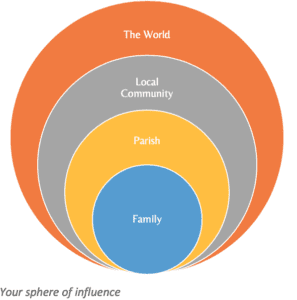A blog for Catholic men that seeks to encourage virtue, the pursuit of holiness and the art of true masculinity.
Fathers, Bring the Joy

“It’s good to be king” was a common refrain in my home, and it was always in reference to me. I was a 5-year-old boy, who, my parents joked, got the royal treatment. My mother and father cooked for me, cleaned for me, and made sure I went to bed early. I was capable of making my bed and getting dressed, but I needed lots of help. I also needed lots of pancakes and ice cream. In essence, it was good to be king.
The paradox of becoming a father, though, is that the head of the house doesn’t get to wear a crown. Instead of a scepter, you get a spatula; instead of royal insignia, you get baby puke stains. Even so, you still have enormous influence. Developing yourself will only help you make a lasting and positive impact.
Resources like the Fight for Milk Apostolate, especially the Four Action Steps of the F4M Framework, give fathers an enormous advantage. This kind of community and practical toolset will only bolster your authority and strengthen your influence, for better…or for worse. So I want to begin by sharing a story about the great father and king, David.
King David’s Story
It was supper time, and the dinner guests at the royal palace were an impressive lineup—the clever Amnon, the beautiful Tamar, the brilliant and preoccupied Solomon, the handsome Absalom with hair as black as a raven, the muscular general of the army, Joab, and, of course, King David himself. Who was not at the table was anyone from the lineage of King David’s predecessor, King Saul.
In the ancient world, whenever a new king came into power, everyone in the family of the previous king was killed. So when King Saul and his son Jonathan died and David’s dynasty was to take control, Saul’s family fled for their lives. Jonathan’s son, whose name was Mephibosheth, was only a five-year-old and crippled in his feet; sadly, because his nurse was in such a hurry to flee, the boy was somehow dropped. For the rest of his life, Mephibosheth lived forgotten, poor, and afraid.
The years went by, and King David’s reign was prosperous. Grateful for all that God had given him, David asked: “Is there yet anyone left of the house of Saul, that I may show him kindness for Jonathan’s sake?” (2 Samuel 9:1). The word David used for “kindness” is chesed. It means mercy or grace. Notice that the question isn’t, “Is there anyone who is smart, strong, or deserving?” But simply, “Is there anyone?”
Upon learning of Mephibosheth, David does not stop searching for him, who had come to live in a “barren place.” Without hesitation, David eventually sends for him.
Mephibosheth limped into the royal palace on his crutches.
“Don’t be afraid,” David said. “I will show kindness to you for the sake of your father Jonathan and will restore to you all the land of your grandfather Saul—and you will eat at my table regularly.”
“What is your servant, that you should regard a dead dog like me?” Mephibosheth asked.
Mephibosheth was given lands, servants, and abundance. Can you imagine the first time he found a place at the table with the likes of Solomon, Tamar, and Joab? “Mephibosheth lived in Jerusalem, for he ate at the king’s table regularly. He was lame in both feet.”
What a scene! Here is a father whose leadership was not constrained by limiting beliefs or pride. King David was magnanimous, he was prosperous and generous and forgiving and life-giving. This magnanimity—this proactive joy—is the grounding principle behind every single one of the skills a man needs.
Joy is contagious
A big difference between you and King David is, of course, that you are not an ancient monarch, or even king of the cul-de-sac. You are free to do what you can only by persuasion, not by fiat. To achieve great things, you’ll need to learn how to think smart and talk with effect. That’s why the Fight for Milk Apostolate essentially boils down to how to think, how to plan, and how to navigate the conversations that matter. Are you willing the good of the other person? Are you listening? Are you leading?
 Guys, listen. You have authority, it’s true, but you are also a man under authority—under the authority of God and his Church. Your job is to become magnanimous, to have more impact in the marketplace, and to shift the spiritual and emotional environment of your home so that you can secure the safety and ultimate flourishing of everyone involved.
Guys, listen. You have authority, it’s true, but you are also a man under authority—under the authority of God and his Church. Your job is to become magnanimous, to have more impact in the marketplace, and to shift the spiritual and emotional environment of your home so that you can secure the safety and ultimate flourishing of everyone involved.
King David’s story reminds us that a man fully alive is able to love daringly. His impact spreads out—from his table to the neighborhood to his local parish and school and, eventually, to the world. As St. Catherine of Sienna said, “If you are what you should be, you will set the whole world ablaze!”
A glorious wife and kids
With a glorious wife and kids comes personal responsibility: you become accountable for your family’s prosperity, health, happiness, and making all the right decisions for their holiness—what I call the fight for milk.
But the culture has by and large forgotten a father’s role not only as progenitor, but also as protector and provider. We have forgotten his gift of self, what that looks like when it’s done right, and his sacrifice. Yet this is what every father is called to—this is his vocation.
That’s why the Fight for Milk Apostolate exists to help men succeed in their vocation to fatherhood. The whole idea is that fatherhood is a skill we can all practice, which means it’s something each of us can improve. This is, by the way, by far one of the biggest paradigm shifts I’ve encountered. Many men already get it, and that’s why they have grown to be stand-out dads. Yet it’s simple: people can change. Or, to put it more clearly, they can grow. You can grow.
But there’s a catch. Change is difficult—really difficult—and people resist it. Instead of growing, we say things like: “I’m not that kind of guy” or “I’m bad at math” and never change. No one ever called it “growing pleasures,” but growing pains.
If you’re like me, a lot of the skills and responsibilities required of a father haven’t come naturally to me. Success in your vocation to fatherhood is going to hurt. And when the going gets tough, it’s important the big picture, your Higher Why. What is success? Success is when everyone in your home is free to pursue the truest, most authentic version of themselves in full relationship with God and each other.
That’s no small order. But I’ve learned that there’s at least one simple act any man can start practicing today that will help him use his influence for the good of others and keep the arrow pointing toward heaven: bring the joy.
Joy: the secret ingredient to success
I want to share something with you that’s been a gamechanger for me. Maybe you’re like me—crazy busy and juggling to get things done, your wife has a lot on her plate too, the kids are full of energy, conflict is inevitable. What are you supposed to do?
I’ve been learning you have to be intentional and bring the joy. Brendan Burchard talks about this a lot and it’s actually a radical idea that started with Saint Paul. In Galatians, Paul puts joy at the very top, it is the fruit of the Spirit, second only to love (Gal. 5:22).
And yet a huge mistake fathers make is to wait for everyone else to set the tone. The problem is that if we wait for our kids or our colleagues to lift the energy in the room we’re going to be more than disappointed—in fact, we’re probably going to be a disappointment.
It’s just not our job to change anyone else; we can only change ourselves. Joy starts with you. So…bring it! Intentionally decide to make the next staff meeting, the next bedtime routine, the next Saturday pancake breakfast better. Remember Nehemiah 8:10, “The joy of the Lord is your strength!”
It’s true that King David was showing Mephibosheth kindness and mercy, but there was something behind the mercy, something of a feasting and music and laughter. I think it was joy. King David’s sphere of influence was spreading nothing less than the joy of the Lord (Psalm 4:7, 28:7, etc.).
Here’s an experiment that works every time: If you, as the father, just smile at your kids they will smile back—or at least squirm with a smirk…and then it’s time to wrestle, dance, ask questions, laugh! A dad’s smile can change the mood in the whole room, you can literally redeem the day! No matter how crazy grocery shopping went or how challenging a client might be, it’s the one thing I keep coming back to—bring the joy.
Your sphere of influence starts with you.
What will your legacy be?
Learn more at www.fightformilk.com
Tyler Blanski is a Catholic father, the author of An Immovable Feast, and the founder of the Fight for Milk apostolate. He lives in Minnesota with his wife and three children. Learn more at www.fightformilk.com
COMMENTS
Reader Interactions